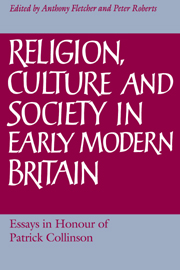Book contents
- Frontmatter
- Contents
- List of illustrations
- List of contributors
- Preface
- List of abbreviations
- Patrick Collinson
- 1 Nicolas Pithou: experience, conscience and history in the French civil wars
- 2 Elizabethan players and minstrels and the legislation of 1572 against retainers and vagabonds
- 3 Cleanliness and godliness in early modern England
- 4 Blood is their argument: men of war and soldiers in Shakespeare and others
- 5 Pragmatic readers: knowledge transactions and scholarly services in late Elizabethan England
- 6 The gardens of Sir Nicholas and Sir Francis Bacon: an enigma resolved and a mind explored
- 7 The Protestant idea of marriage in early modern England
- 8 James VI and I: furnishing the churches in his two kingdoms
- 9 A British patriarchy? Ecclesiastical imperialism under the early Stuarts
- 10 The Anglo-Scottish Union 1603–1643: a success?
- 11 Popery, purity and Providence: deciphering the New England experiment
- 12 Provincial preaching on the eve of the Civil War: some West Riding fast sermons
- 13 Popular form, Puritan content? Two Puritan appropriations of the murder pamphlet from mid-seventeenth-century London
- 14 The two ‘National Churches’ of 1691 and 1829
- Bibliography of the published writings of Patrick Collinson, 1957–1992
- Index
4 - Blood is their argument: men of war and soldiers in Shakespeare and others
Published online by Cambridge University Press: 03 December 2009
- Frontmatter
- Contents
- List of illustrations
- List of contributors
- Preface
- List of abbreviations
- Patrick Collinson
- 1 Nicolas Pithou: experience, conscience and history in the French civil wars
- 2 Elizabethan players and minstrels and the legislation of 1572 against retainers and vagabonds
- 3 Cleanliness and godliness in early modern England
- 4 Blood is their argument: men of war and soldiers in Shakespeare and others
- 5 Pragmatic readers: knowledge transactions and scholarly services in late Elizabethan England
- 6 The gardens of Sir Nicholas and Sir Francis Bacon: an enigma resolved and a mind explored
- 7 The Protestant idea of marriage in early modern England
- 8 James VI and I: furnishing the churches in his two kingdoms
- 9 A British patriarchy? Ecclesiastical imperialism under the early Stuarts
- 10 The Anglo-Scottish Union 1603–1643: a success?
- 11 Popery, purity and Providence: deciphering the New England experiment
- 12 Provincial preaching on the eve of the Civil War: some West Riding fast sermons
- 13 Popular form, Puritan content? Two Puritan appropriations of the murder pamphlet from mid-seventeenth-century London
- 14 The two ‘National Churches’ of 1691 and 1829
- Bibliography of the published writings of Patrick Collinson, 1957–1992
- Index
Summary
‘As at Turwin I was a demi-soldier in jest, so now I became a martialist in earnest.’ This remark, taken from Thomas Nashe's The Unfortunate Traveller, might help us to recognise a categorical shift, a change from an historical moment when fighting was a chivalric sport or form of group-specific behaviour to a moment when fighting was an occupation – from a moment when a fighter was regarded as a gentleman-amateur to one in which he was a professional or ‘martialist’. The opposition of the two terms corresponds to the opposition made by Michel Foucault between the ‘homme de guerre’ and the professional ‘militaire’, an opposition which is central to this essay. Nashe's noun ‘martialist’ is cited only from 1576 in OED and is not current in English: its appearance suggests that war in the period was changing from something familiar in the order of things to an object of inquiry.
In what follows I want to argue that a reading of the Shakespearean canon might lead us to conclude that at the end of the sixteenth century the age of the ‘soldier’ had passed and the age of the ‘martialist’ had arrived. Because, perhaps, of the recognition of a tradition of pacifism established by Erasmus, More and others, ‘martialists’ are constructed in Shakespearean texts as suspect figures, often, despite the victory at Lepanto in 1571, demonised in the figure of the ‘cruel Turk’.
- Type
- Chapter
- Information
- Religion, Culture and Society in Early Modern BritainEssays in Honour of Patrick Collinson, pp. 84 - 101Publisher: Cambridge University PressPrint publication year: 1994
- 1
- Cited by



